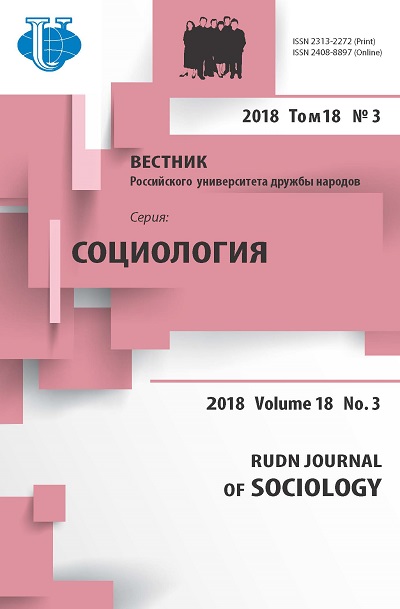NATIONAL VALUES OF THE RUSSIAN EDUCATION UNDER THE INTERNATIONAL INTEGRATION
- Authors: Shafranov-Kutsev GF1, Yarkova EN1
-
Affiliations:
- Tyumen State University
- Issue: Vol 18, No 3 (2018)
- Pages: 532-541
- Section: Sociological lectures
- URL: https://journals.rudn.ru/sociology/article/view/19188
- DOI: https://doi.org/10.22363/2313-2272-2018-18-3-532-541
- ID: 19188
Cite item
Full Text
Abstract
About the authors
G F Shafranov-Kutsev
Tyumen State University
Email: shafranov-kutsev@utmn.ru
- Lenina St., 25, Tyumen, 625000, Russia
E N Yarkova
Tyumen State University
Email: yarkovaeleni@yandex.ru
- Lenina St., 25, Tyumen, 625000, Russia
References
- Ashin G.K. Elitnoe obrazovanie [Elite education]. Obschestvennye Nauki i Sovremennost. 2001; 5: 82-99 (In Russ.).
- Boguslavsky M.V. Konservativnaja strategija modernizacii rossijskogo obrazovanija v XX - nachale XXI veka [The conservative strategy of modernization of the Russian education in the 20 - early 21 century]. Problemy Sovremennogo Obrazovaniya. 2014; 1: 5-11 (In Russ.).
- Chetverikova O.N. Perestrojka obrazovanija i vospitanija v Rossii skvoz prizmu geopolitiki [Reconstruction of the Russian education through the prism of geopolitics]. Vestnik Eletskogo Gosudarstvennogo Universiteta im. I.A. Bunina. Serija: Pedagogika. 2015: 3-30 (In Russ.).
- Egorychev A.M. Nacionalnaja tradicija zhizni i socialnoe obrazovanie v Rossii [National tradition of life and social education in Russia]. Alma Mater. 2016; 10: 20-28 (In Russ.).
- Gilbo E.V. O vysshem obrazovanii v SSSR i RF [On the higher education in the USSR and Russia]. http://shel-gilbo.livejournal.com/99182.html (In Russ.).
- Gritsenko I.A. Klipovoe myshlenie - novy etap razvitija chelovechestva [Clip thinking as a new stage in the development of humankind]. Uchenye Zapiski. 2015; 4: 71-74 (In Russ.).
- Kharseeva N.V., Yanko E.V. Problemy duhovno-nravstvennogo vospitanija v sovremennoj Rossii [Problems of spiritual-moral education in contemporary Russia]. Aspectus. 2015; 2: 59-65 (In Russ.).
- Hedstrom P., Ylikoski P. Causal mechanisms in the social sciences. Annual Review of Sociology. 2010; 36: 49-67.
- Karypov A. Fundamentalnoe obrazovanie kak glavnoe konkurentnoe preimuschestvo [Fundamental education as a key competitive advantage]. Pervy Ekonomichesky. 2016; 58: 56-58 (In Russ.).
- Khorova P.A. K voprosu o tradiciyah rossijskogo obrazovaniya [On the traditions of the Russian education]. Khorova P.A., Vishnevsky Yu.R. (Eds.) Innovacionny potencial molodezhi: globalizaciya, politika, integraciya. Ekaterinburg; 2016. Pp. 507-511 (In Russ.).
- Kolin K.K. Informacionnaja antropologija: pokolenie next i novaja ugroza rassloenija chelovechestva v informacionnom obshhestve [Information anthropology: Generation ‘next’, and a new risk of the stratification of humankind in information society]. Vestnik Chelyabinskoj Gosudarstvennoj Akademii Kultury i Iskusstv. 2011; 4 (28): 32-36 (In Russ.).
- Kopkas J. Is the casting of utilitarian as discordant with arts education philosophy justified? Journal of Thought. 2013; 5: 52-72.
- Maleeva A. Shkolny standart [The school standard]. Mashiny i Mekhanizmy. 2011; 9: 28-35 (In Russ.).
- Matveeva S.V., Filinova N.V., Matveev P.A. Patrioticheskoe vospitanie kak faktor formirovanija cennostnyh ustanovok v vysshej shkole [Patriotic education as a factor of the values formation in the higher school]. Problemy Sovremennogo Pedagogicheskogo Obrazovaniya. 2016; 51: 270-276 (In Russ.).
- Mironov V.V. Bolonsky process i nacionalnaja sistema obrazovanija [The Bologna process and the national system of education]. Vestnik OGU: Gumantarnye Nauki. 2005; 2: 4-8 (In Russ.).
- Nadeeva M.I. Obrazovatelnye cennosti i formirovanie obschekulturnoj kompetencii studentov tehnologicheskogo universiteta [Educational values and the formation of the students’ general cultural competence in the technological university]. Vestnik Kazanskogo Tekhnologicheskogo Universiteta. 2011; 22: 333-337 (In Russ.).
- Newcombe N.S., Ambady N., Louis Gomez J., Klahr D., Linn M., Miller K., Mix K. Psychology’s role in mathematics and science education. American Psychologist. 2009; 64 (6): 538-550.
- Novikov A.M. Chto takoe elitarnoe obrazovanie [What the elite education is]. Narodnoe Obrazovanie. 2004; 1: 62-66 (In Russ.).
- Ogurtsov A.P. Postmodernistsky obraz cheloveka i pedagogika [The postmodernist image of man and pedagogy]. Chelovek. 2001; 3-4: 18-27 (In Russ.).
- Patsukevich O.V. Massovizacija vysshego obrazovanija kak sledstvie globalizacii [Massivization of the higher education as a consequence of globalization]. http://elar.urfu.ru/bitstream/10995/ 32264/1/klo_2015_124.pdf (In Russ.).
- Prokhorov V.A. Fundamentalnost - osnovnoj princip postroenija inzhenernogo obrazovanija [Fundamental basis as a key principle of the engineering education]. Inzhenernoe Obrazovanie. 2012; 11: 82-84 (In Russ.).
- Schoenebeck von H. Antipadagogik im Dialog: eine Einfiihrung in antipadagogische. Basel; 1989.
- Sharonova S.A. Gumanitarnaja sostavljajushhaja fragmentarnogo obrazovanija [The humanitarian component of the fragmentary education]. E.A. Zeletdinova (Ed.). Socialno-gumanitarnoe obrazovanie vysshej shkoly Rossii v XXI veke. Astrakhan; 2009. Pp. 38-45 (In Russ.).
- Mahmoudi S., Jafari E., Nasrabadi H.A., Liaghatdar M.J. Holistic education: An approach for 21 century. International Education Studies. 2012; 5 (2): 178-186.
- Starr D. China and the Confucian Education Model. Durham University; 2012.
- Tarrant I., Tarrant J. Satisfied fools: Using J.S. Mill’s notion of utility to analyze the impact of vocationalism in education within a democratic society. Journal of Philosophy of Education. 2004; 38 (1): 107-120.
- Koncepciya patrioticheskogo vospitaniya v Rossii. Istoricheskaya pamyat i grazhdanskoe samosoznanie [Conception of the Patriotic Education in Russia. Historical Memory and Civil Self-Conscience]. Moscow; 2014 (In Russ.).
- Upasana K. A comparative study of traditional education & education with special reference to India. International Journal of Research in Management & Business Studies. 2014; 2 (5): 149-162.
- Vakhitov D.R. Obrazovatelnye sistemy SSSR i Zapada: sravnitelny analiz preimuschestv i nedostatkov [Educational systems of the USSR and the West: A comparative analysis of advantages and disadvantages]. Vestnik TISBI. 2015; 1: 216-235 (In Russ.).
- Zapesotsky A.S. Ideya kulturocentristskoj modeli obrazovaniya [The idea of culture-centered model of education]. A.S. Zapesotsky (Ed.). Kulturno-antropologicheskie osnovy obrazovatelnoj deyatelnosti: k voprosu o razrabotke kulturocentristskoj modeli vysshego obrazovaniya. Saint Petersburg; 2009. Pp. 11-26 (In Russ.).
- Zharenova O.A., Kechil N.V., Pakhomov E.Yu. Intellektualnaja migracija rossijan. Blizhnee i dalnee zarubezhie [Intellectual Migration of Russians. The Near and Far Abroad]. Moscow; 2002 (In Russ.).
Supplementary files













